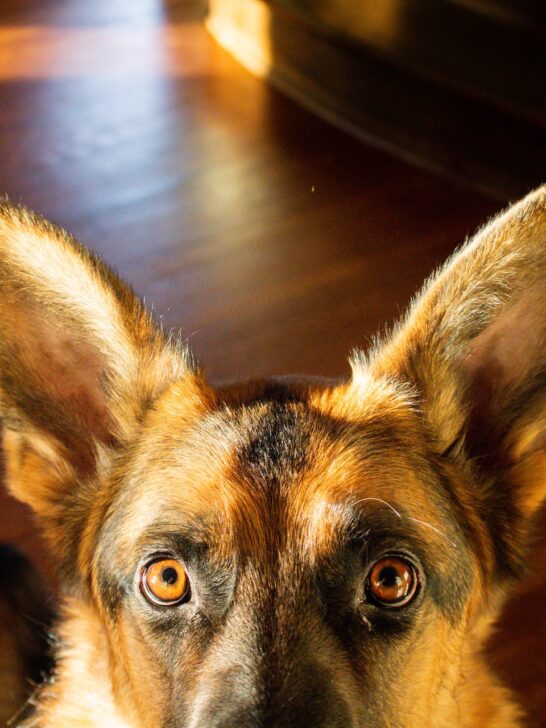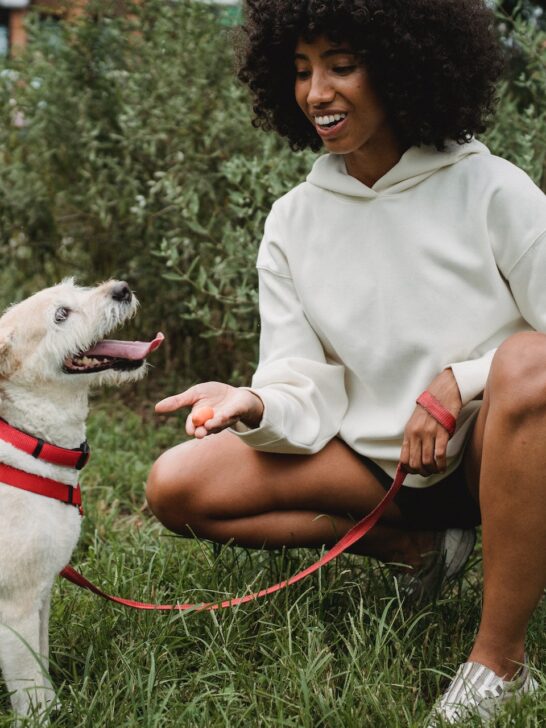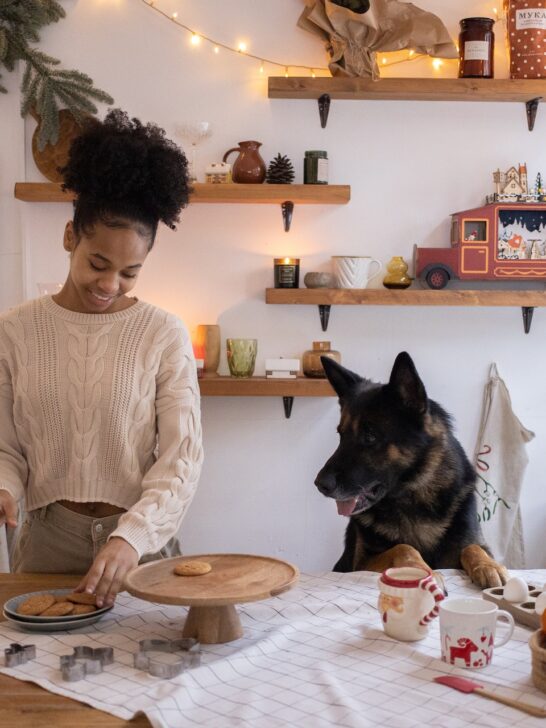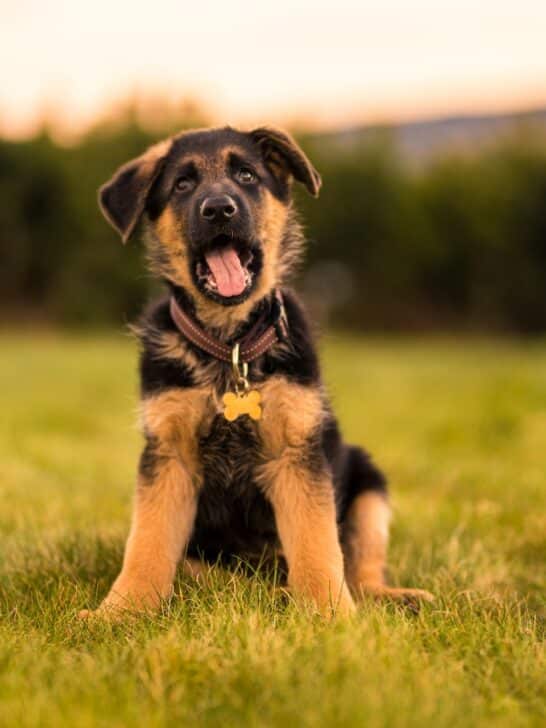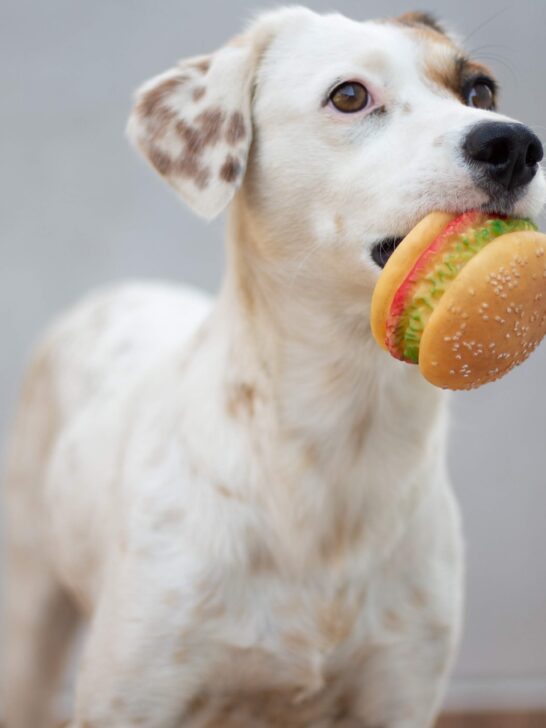How to Take Care of a 3-Month-Old German Shepherd
Congratulations on adopting a 3-month-old German Shepherd! But don’t, for a second, think that it’s going to be an easy journey. Puppies, especially German Shepherd puppies, are quite the challenge!
This article will cover everything you need to know about your young German Shepherd.
We will tackle their average size and height, nutrition, physical and behavior changes, exercise, potty training, socialization, and health. Let’s go!
Average Size and Height of a 3-Month-Old German Shepherd
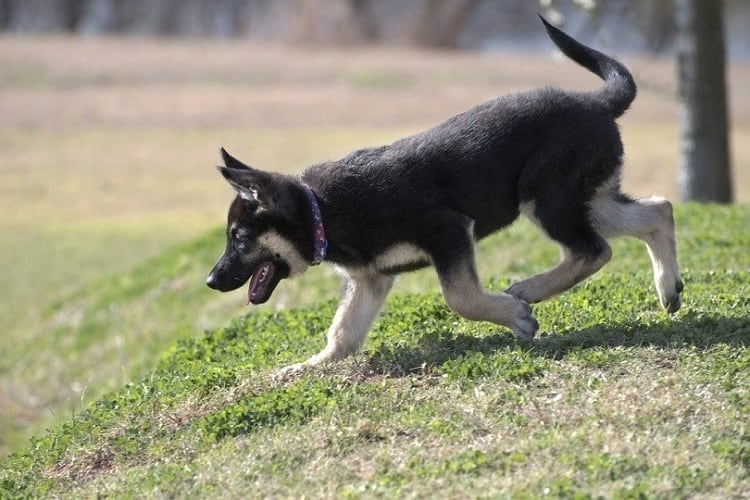
At three months old, male GSD puppies should reach a height of around 27.13 centimeters, and the female counterpart usually grows 25.5 centimeters tall.
The puppies’ growth rate is usually 40 percent, so they will continue to develop steadily as they age.
Moreover, a male German Shepherd’s average weight is 14.2kg, which is 41.18% of his total growth. On the other hand, female German Shepherds usually weigh 12.1kg, also 41.18% of their full growth.
German Shepherd puppies grow very quickly during their first few months of life and can gain up to 5 pounds a week.
Your puppy will continue to grow until he is around 18 months old and usually reaches its full adult height by 12 months old.
Nutrition for a 3-Month-Old German Shepherd Puppy

Growing puppies need the right combination of nutrients to help them develop properly and stay healthy, so it’s vital to choose food that will provide everything they need.
To keep your dog’s diet varied and interesting, experts recommend feeding your 3-month-old German Shepherd 2 cups of high-quality dog food daily.
You can divide the food amount into several smaller feeds during the day.
For the first three months, your German Shepherd puppy needs a diet high in protein, carbohydrates, and fat to build muscle mass.
Ensure your dog gets 25% of his calories from protein sources such as soy products, eggs, meat, poultry, and fish. Cheese and yogurt are also good protein sources, and puppies love them.
In addition, make sure that the food you choose contains enough calcium. It is essential for your German Shepherd puppy’s strong bones and teeth.
You should also ensure that your dog receives adequate vitamins and minerals, such as Omega-3s and B complex.
Always give your dog a healthy diet and enough water. Add fresh water to your German Shepherd pup’s drinking bowl regularly.
Physical and Behavioral Changes of a 3-Month-Old German Shepherd
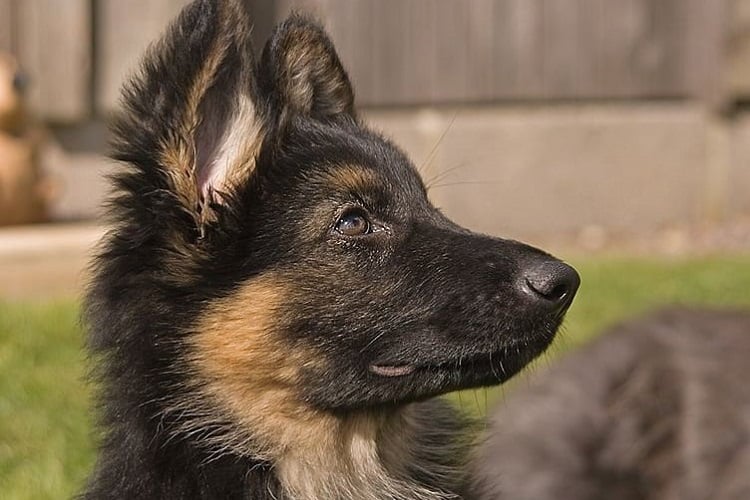
German Shepherds reach the juvenile stage at 12 weeks old. At this point, they are now in the socialization period.
This period will put your patience to the test, and it’s crucial to provide appropriate instruction for any behavioral problems.
While they will appear more mature, their puppy nature is still evident. They might get into some trouble, especially if it involves biting and leaping on other people.
They are growing fast and have packed some pounds. Their puppy coat will also change significantly, and their fur will begin to fade as their adult hair develops.
A racing stripe on the spine is a sign that their coat is already changing. This process usually takes several months to complete, so don’t be alarmed if you see some shedding.
Because they now have all of their puppy teeth, they’ll enter the teething stage. It will continue for a few more months, during which their adult teeth will replace their milk teeth.
Your German Shepherd puppy will also become more independent and want to explore his surroundings. The barks will become louder, and it will be able to run and jump for more extended periods.
You may also start to see changes in its behavior, such as chewing on things or digging in the yard.
To discourage these behaviors, provide your puppy with plenty of chew toys and redirect his attention when he starts digging.
Your 3-month-old German Shepherd may also experience stranger or separation anxiety at this age. It is normal behavior, and you can manage it through positive training techniques.
Training Your 3-Month-Old German Shepherd
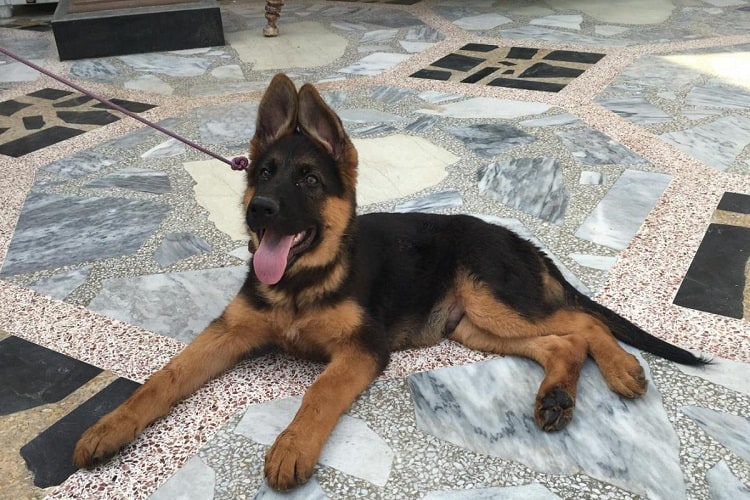
Your German Shepherd is still a puppy at this age and very receptive to learning new things. The German Shepherd breed is intelligent and can learn quickly.
However, they can also be stubborn, so be patient and consistent with puppy training.
Your 3-months old German Shepherd puppy is now old enough to learn how to sit, stand, or hold a down position.
At this point, he will also begin learning how to answer commands, assume a position, and adopt the role of a friend.
Your German Shepherd can learn to recognize close friends and relatives at three months old. While this allows your GSD puppy to be more friendly when guests arrive, he should also learn to walk outdoors without misbehaving.
It is time to take your German Shepherd puppy out to increasingly crowded locations and expose him to new things.
You may also establish anchors for your puppy for recall training. If the obedience training doesn’t work right away, don’t be disappointed.
It is an endless job to instill good recall in your German Shepherd puppy. Remember that you should not force your GSD puppy into doing your command.
If your German Shepherd doesn’t react when you use the cues, return to re-establishing the anchors and giving it a try after a few days.
Toys for a 3-Month-Old German Shepherd
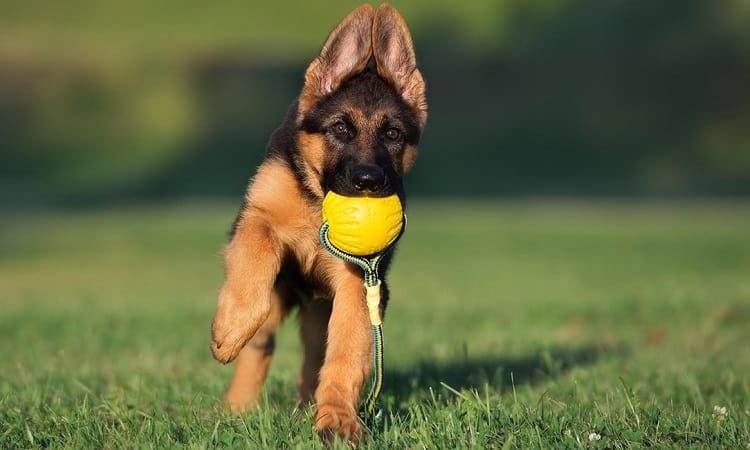
One crucial way to keep your pup happy and healthy is to ensure they have plenty of toys.
Remember that pups at this age are still growing and developing, so their toys should be sturdy and durable.
They should also be size-appropriate because if it is too small, your pup could choke on them, while if it is too big, they won’t be able to get their mouths around it.
When buying toys for your German Shepherd puppy, choose something that will allow your pup to burn off all that energy. You can go for a tug toy or a ball that’s easy to chase.
Second, select an item that helps with teething. Many GSD pups start losing their baby teeth around three months old, so it’s essential to have something soft on the gums.
A soft plush toy or a chew bone are both excellent choices.
Don’t forget the importance of mental stimulation. Some good toy options are interactive puzzles that dispense treats and plush toys with squeakers.
These toys can help keep your German Shepherd puppy’s mind sharp as he grows older.
3-Month-Old German Shepherd – Health Issues

It’s important to keep an eye on your 3-month-old German Shepherd’s health. Your German Shepherd puppy should be vaccinated against rabies, distemper, and parvovirus at this age.
It would be best if you also start deworming him on a monthly basis. Keep an eye out for changes in his appetite or energy levels, as these can be signs of illness.
Allergies are one of the dogs’ most common health conditions, and German Shepherds are no exception.
When you see your German Shepherd puppy scratching a lot, has red or irritated skin, or is losing hair, he may suffer from allergies.
Joint issues are also common in German Shepherds due to their large size and rapid growth. Your dog will be limping or seems to be in pain if he has joint problems.
Panosteitis is a condition that affects the long bones in the legs and is most common in large breeds like German Shepherds. Symptoms include lameness, pain, and stiffness.
If you think your puppy may have any health concerns, take him to the veterinarian for an evaluation.
With proper care and treatment, most puppies can recover from these health problems and live happy and healthy lives.
Exercise Needs for a 3-Month-Old German Shepherd
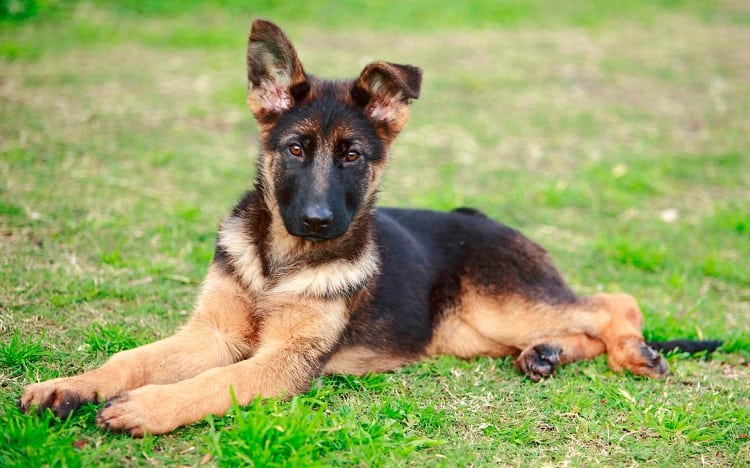
German Shepherds are active dogs that require regular exercise or can become destructive and hazardous to others if they don’t get enough of it.
Always find time to take your German Shepherd puppy for regular walks around the house or your neighborhood.
It will keep your GSP pup mentally stimulated while also allowing him to use some of his energy. Your young pup will require lots of exercises to grow strong and healthy.
A three-month-old German shepherd requires about 30 minutes of activity each day. It might include walking or playing fetch, as well as strength training.
Excessively or insufficiently exercising can lead to problems in the long run. If you live in an area with cold winters, you’ll need to find other ways to keep your puppy active indoors.
Here are some puppy exercise ideas:
- Get a set of puppy stairs and place them in different rooms of your house. Encourage your puppy to use them by offering treats at the top of the stairs.
- Set up an agility course in your yard or living room using household items like chairs, laundry baskets, and blankets.
- Hide toys around the house and have your puppy search for them.
- Take your puppy to a dog park or doggie daycare for socialization and exercise.
Providing your German Shepherd with enough exercise is essential for their physical and mental health.
With a bit of creativity, you can find ways to keep your puppy active and happy, even on the coldest of days.
Sleep Requirements for a 3-Month-Old German Shepherd
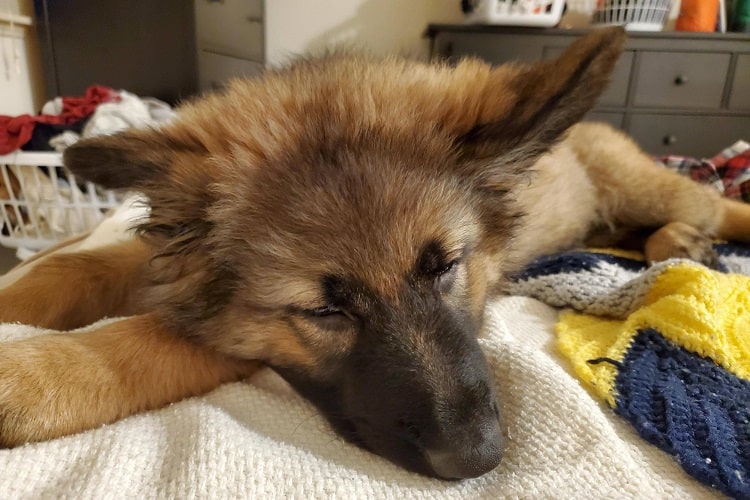
A 3-month-old German Shepherd puppy sleeps for approximately 16 to 20 hours daily. Adult German Shepherds should get between nine and fourteen hours of sleep each night.
However, it’s not unusual for your puppy to wake up at night. Their longest sleep is usually right before dawn.
Older German Shepherd dogs usually sleep less during the day and more at night. Their sleeping patterns will alter as they become older. When a dog reaches a specific age, he may begin taking daytime naps.
Also read:
- How to Take Care of a 4-Month-Old German Shepherd
- How to Take Care of a 1-Month-Old German Shepherd Puppy
- 8-Week-Old German Shepherd – Routine And Care
Conclusion
3-month-old German Shepherd puppies are adorable, but they will grow and change significantly in the next few months.
Keep an eye on their health, behavior, and appearance. An immediate reaction is necessary to ensure they will grow into healthy, happy dogs.
Resources:

























